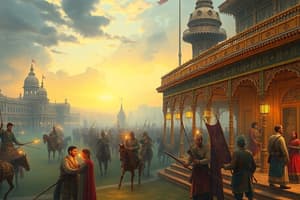Podcast
Questions and Answers
Who was defeated in the Battle of Plassey?
Who was defeated in the Battle of Plassey?
- The Mughal King Shah Alam
- The British Army
- The nawab of Awadh
- Siraj ud Daulah (correct)
Which of these battles was fought in 1764?
Which of these battles was fought in 1764?
- Second Anglo-Mysore War
- First Anglo-Maratha War
- Battle of Plassey
- Battle of Buxar (correct)
What was the primary aim of the Purna Swaraj established in 1922?
What was the primary aim of the Purna Swaraj established in 1922?
- To initiate the Anglo-Maratha Wars
- To achieve Dominion status (correct)
- To propose the Cabinet Mission
- To reject the Cripps Mission
What significant proposal did M.N. Roy make in 1934?
What significant proposal did M.N. Roy make in 1934?
When was the Cabinet Mission that discussed independence from Britain formed?
When was the Cabinet Mission that discussed independence from Britain formed?
Flashcards are hidden until you start studying
Study Notes
The Battle of Plassey
- This significant battle occurred in 1757.
- It was fought between the Nawab of Bengal, Siraj ud-Daulah, and the British East India Company.
- The British East India Company, led by Robert Clive, emerged victorious, marking a pivotal moment in the establishment of British dominance in India.
- The victory at Plassey allowed the British East India Company to expand its territories, establish political control, and increase its economic influence in Bengal.
The Battle of Buxar
- This battle occurred in 1764.
- The British East India Company confronted a combined army of the Nawab of Bengal, the Nawab of Awadh, and the Mughal Emperor Shah Alam II.
- The British forces, led by Major Hector Munro, triumphed decisively, showcasing their military superiority.
- The victory at Buxar significantly strengthened the British East India Company's position in India, allowing them to exercise greater control over the Mughal Empire.
Anglo-Maratha Wars
- The Anglo-Maratha Wars represent a series of conflicts between the British East India Company and the Maratha Confederacy, a formidable Indian empire in the 18th and 19th centuries.
First Anglo-Maratha War (1775–1782)
- This war arose due to territorial disputes and conflicting interests in the Deccan region.
- The war ended with the Treaty of Salbai, which restored peace but did not settle the underlying tensions between the British and the Marathas.
Second Anglo-Maratha War (1803–1805)
- The Second Anglo-Maratha War was sparked by British apprehensions about Maratha power and their ambition to control territories in central India.
- The British ultimately emerged victorious, expanding their influence and consolidating their grip on significant regions.
- This war led to further territorial gains for the British East India Company, solidifying their presence in India.
Third Anglo-Maratha War (1817–1818)
- The Third Anglo-Maratha War marked the final clash between the British and the Marathas.
- The war was triggered by the growing instability within the Maratha Confederacy and British attempts to exploit the situation.
- This war resulted in the complete defeat of the Marathas and the annexation of their remaining territories by the British.
- The Third Anglo-Maratha War effectively dismantled the Maratha Confederacy and marked a significant turning point in British dominance in India.
Anglo-Mysore Wars
- The Anglo-Mysore Wars were a series of military confrontations between the British East India Company and the Kingdom of Mysore, a powerful state located in South India, during the 18th century.
First Anglo-Mysore War (1767-1769)
- This war arose from disputes over territorial control in the Carnatic region of South India.
- The war ended with a stalemate, as the British were unable to achieve their objectives.
Second Anglo-Mysore War (1780-1784)
- The Second Anglo-Mysore War was marked by the brilliant leadership of Tipu Sultan, the ruler of Mysore.
- This war saw heavy fighting and a clash of military strategies, but the British emerged victorious with the support of their allies.
Third Anglo-Mysore War (1790-1792)
- The Third Anglo-Mysore War escalated tensions between the British and Tipu Sultan.
- The conflict saw the British, along with their allies, defeat Tipu Sultan and capture the Mysore capital, Srirangapatna.
- Tipu Sultan was killed in battle, marking the end of the Mysore Kingdom's independence.
- The conquest of Mysore provided the British East India Company with control over a significant territory in Southern India.
Other Events
-
1922 - This year witnessed the Lahore Session of the Indian National Congress, presided over by Jawaharlal Nehru.
-
The session adopted the goal of "Purna Swaraj," meaning "complete independence," which marked a shift in the Congress's political demand.
-
1934 - The concept of a Constituent Assembly, a body responsible for drafting India's constitution, was proposed by M.N. Roy, a prominent Indian revolutionary and socialist.
-
1935 - The Indian National Congress officially demanded dominion status, a form of self-government within the British Empire.
-
1940 - Marking a significant step towards granting India self-rule, the British government accepted the principle of dominion status for India.
-
1942 - The Cripps Mission, led by Sir Stafford Cripps, was sent to India to negotiate a new constitutional framework.
-
The Muslim League, led by Muhammad Ali Jinnah, rejected the mission's proposals, due to concerns for Muslim interests.
-
1946 - The Cabinet Mission, another delegation from the British government, visited India to discuss the transfer of power and the formation of an independent India.
-
The Mission aimed to address the complex political issues, including the division of India into provinces.
-
November 1946 - The Constituent Assembly, tasked with drafting India's constitution, was finally established. This assembly would play a crucial role in India's transition to an independent nation.
Studying That Suits You
Use AI to generate personalized quizzes and flashcards to suit your learning preferences.




